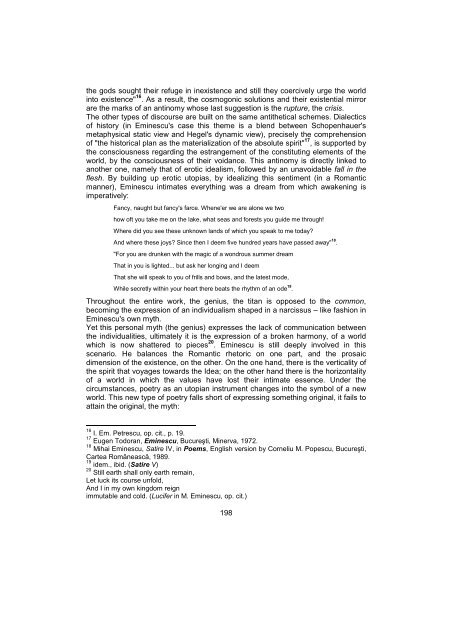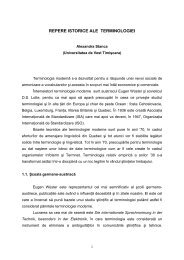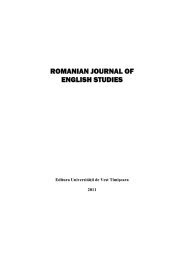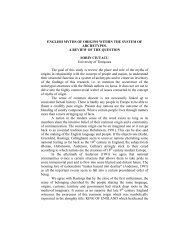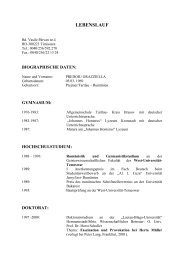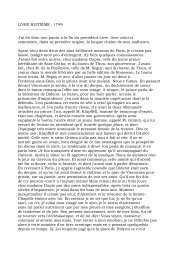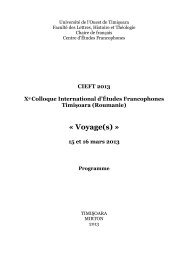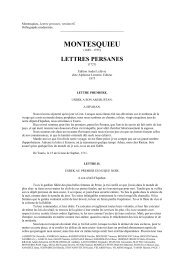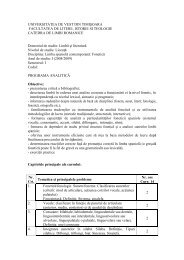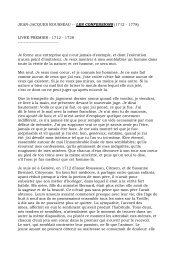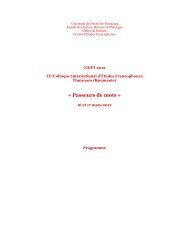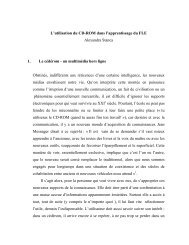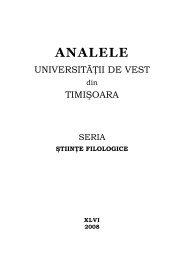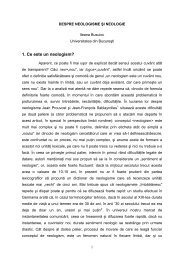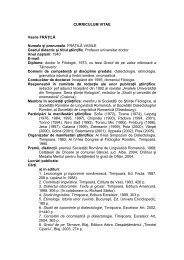- Seite 1 und 2:
ROXANA NUBERT (Hrsg.) TEMESWARER BE
- Seite 3 und 4:
ROXANA NUBERT (Hrsg.) unter Mitarbe
- Seite 5:
Peter Kottler, zum 60. Geburtstag g
- Seite 8 und 9:
DARIA-MARIA JURCA - TONIA MARIŞESC
- Seite 10 und 11:
MATHILDE HENNIG ...................
- Seite 13 und 14:
Vorwort Mit diesem Band wird die He
- Seite 15 und 16:
VÉRONIQUE LIARD- BRANDER ANGERS Li
- Seite 17 und 18:
schaffen will oder muß. Hier ist h
- Seite 19 und 20:
lediglich Ausdruck einer Neurose. J
- Seite 21 und 22:
BEATE PETRA KORY TEMESWAR Paradigme
- Seite 23 und 24:
überprüfen: So prägt die Erfahru
- Seite 25 und 26:
Despite all, there is indeed a sens
- Seite 27 und 28:
zwei verschiedene Perspektiven deut
- Seite 29 und 30:
totalen Außenseiterexistenz entsch
- Seite 31 und 32:
der Individuation verkörpern, den
- Seite 33 und 34:
Diese „augenblicklichen Illuminat
- Seite 35 und 36:
erinnert sowohl an das Bild, das de
- Seite 37:
Petersen, Jürgen H., Der deutsche
- Seite 40 und 41:
und Literatur, hier nimmt er aber a
- Seite 42 und 43:
haben, hinterläßt ihm diese erste
- Seite 44 und 45:
überhaupt noch um unsere Seelen? 1
- Seite 46 und 47:
Das Geschehen spielt 30-40 Jahre sp
- Seite 48 und 49:
Ja, sagte er, Vorarlberg und das Bu
- Seite 50 und 51:
machten, auch das rumänische Leser
- Seite 52 und 53:
wollte eigentlich jenen höheren Le
- Seite 54 und 55:
Roxana Nubert ein. Siehe: Roxana Nu
- Seite 56 und 57:
Rezeption 1950 - 1990 Die negative
- Seite 58 und 59:
In den Tagebüchern wie in seinen E
- Seite 60 und 61:
das die Umkehrung des inneren und
- Seite 62 und 63:
Claudines Reise unterbricht den All
- Seite 64 und 65:
durch menschenfeindlichen architekt
- Seite 66 und 67:
nicht ohne Stolz seine Fähigkeit,
- Seite 68 und 69:
„locus terribilis“ im Sinne Obe
- Seite 70 und 71:
Nubert, Roxana (1998): Krankheit un
- Seite 72 und 73:
Vorgeschichte Der Schriftsteller un
- Seite 74 und 75:
Rettungsmöglichkeit, dies Malheur
- Seite 76 und 77:
von Heiligkeit" (UF, 89) wünscht.
- Seite 78 und 79:
des Endes. Überraschenderweise wir
- Seite 81 und 82:
ILEANA-MARIA RATCU BUKAREST Zur Ges
- Seite 83 und 84:
sich nach einem Theater sehnte. Man
- Seite 85 und 86:
und das Gebäude als unmittelbar in
- Seite 87 und 88:
DARIA-MARIA JURCA - TONIA MARIŞESC
- Seite 89 und 90:
Francesco Griselini Als Ergebnis ei
- Seite 91 und 92:
und eine Abtei der Minoriten, siebe
- Seite 93 und 94:
Sicht auf die mangelhafte erzieheri
- Seite 95 und 96:
verrichten. Nur eine geringe Zahl d
- Seite 97 und 98:
naturwissenschaftlichen Beschäftig
- Seite 99 und 100:
nachdem sie mehrere Liter “Rakie
- Seite 101 und 102:
Die Taufe Ehrler ist der einzige, d
- Seite 103 und 104:
daß eine Kerze bei dem Grab ständ
- Seite 105 und 106:
RADEGUNDE TÄUBER NUFRINGEN Johann
- Seite 107 und 108:
literarischen Lehrjahre Preyers bli
- Seite 109 und 110:
Die Tatsache, daß es im südöstli
- Seite 111 und 112:
„unbedeutenden“ Beitrag. Preyer
- Seite 113 und 114:
abgeschlossen wurden: Canova, Die S
- Seite 115 und 116:
dem historischen Stoff seiner Drame
- Seite 117 und 118:
Basis für eine umfassendere, verti
- Seite 119 und 120:
„Groß sein“ kann danach nur de
- Seite 121 und 122:
Übergeschichtliche; 48 als treiben
- Seite 123 und 124:
die East India Company (Of India).
- Seite 125 und 126:
entwaffnen und die Waffen zu überg
- Seite 127 und 128:
angesichts der starken Bedrohung du
- Seite 129 und 130:
diese Handlungsstränge wie folgt:
- Seite 131 und 132:
zuversichtlichen Hochton aus, wodur
- Seite 133 und 134:
Gegensatz dazu einen Zustand der Sc
- Seite 135 und 136:
gemeinsame Sache machen ließen. 81
- Seite 137 und 138:
und nach der verlorenen Schlacht zu
- Seite 139 und 140:
Der Scharfblick, die Weitsicht des
- Seite 141 und 142:
Empörung (s. w. o.) wird auch zum
- Seite 143 und 144:
Stimmung, die ja auch den Verfasser
- Seite 145 und 146:
Dieser Gruppe sind (abgesehen von S
- Seite 147 und 148: weibliche Heldinnen, auch an Goethe
- Seite 149 und 150: Wohin hat mich der große Schmerz g
- Seite 151 und 152: es dem Publikum leichter gemacht, d
- Seite 153 und 154: lebenden Völkern viel zum unerbitt
- Seite 155 und 156: hohe Modulationsfähigkeit dieses m
- Seite 157 und 158: einem Thema wie dem vorliegenden, d
- Seite 159 und 160: kaum regionale Bedeutung beanspruch
- Seite 161 und 162: dramaturgischen Analogieprinzip fu
- Seite 163 und 164: Die Ansprüche an das Publikum sind
- Seite 165 und 166: Zusammenhang mit dem Auffinden der
- Seite 167 und 168: gelegentlich der wissenschaftlichen
- Seite 169 und 170: KINGA GÁLL TEMESWAR Ein Presseange
- Seite 171 und 172: zweiten Teil bildete der Anhang, de
- Seite 173 und 174: EDUARD SCHNEIDER MÜNCHEN Der Temes
- Seite 175 und 176: gewirkt, sie waren der Zauber, der
- Seite 177 und 178: erschien posthum, wenige Wochen nac
- Seite 179 und 180: Herausstellung der Unterschiede im
- Seite 181 und 182: höheren Schulen magna cum laude be
- Seite 183 und 184: BOGDAN MIHAI DASCALU TEMESWAR Aspek
- Seite 185 und 186: Voraussetzungen auch die Lese-Erwar
- Seite 187 und 188: Die Vorahnung, daß Martin sich ein
- Seite 189 und 190: Trotz der vielen Ähnlichkeiten zwi
- Seite 191 und 192: das Bild der Tante begleiten. Man g
- Seite 193 und 194: DUMITRU TUCAN TEMESWAR The collapse
- Seite 195 und 196: transition point. Antithesis is the
- Seite 197: Eminescu. However, beyond being som
- Seite 201 und 202: CARMEN BLAGA TEMESWAR Paradigms and
- Seite 203 und 204: open. It has aroused passions, unbr
- Seite 205 und 206: Church, two parallel organizations
- Seite 207 und 208: himself at the Court of Peter the G
- Seite 209 und 210: cultural movements from the 16 th c
- Seite 211 und 212: the Ottoman Empire (Alexandrescu 19
- Seite 213 und 214: MICHAEL FERNBACH TEMESWAR Ästhetis
- Seite 215 und 216: Friedrich Schillers „ästhetische
- Seite 217 und 218: Ästhetik und ästhetische Erziehun
- Seite 219 und 220: Überwindung der Sinnlichkeit und d
- Seite 221 und 222: GUNDULA-ULRIKE FLEISCHER KLAUSENBUR
- Seite 223 und 224: Aus niedriger Häuser dumpfen Gemä
- Seite 225 und 226: hier mit der “parodistischen” A
- Seite 227 und 228: CLAUDIA ICOBESCU TEMESWAR Zur Evalu
- Seite 229 und 230: gelten sollten: Er sollte nicht dur
- Seite 231 und 232: motiviert oder demotiviert die Stud
- Seite 233 und 234: Gunter Narr, 1994. Salewsky, Heidem
- Seite 235 und 236: TANJA BECKER DAAD Die Produktion fa
- Seite 237 und 238: Texttransformation, haben, die uns
- Seite 239 und 240: Sprache transferieren soll, die von
- Seite 241 und 242: sowohl in Rumänien als auch in Fra
- Seite 243 und 244: und das Wissen um die genaue Strukt
- Seite 245 und 246: KARL STOCKER MÜNCHEN Literaturunte
- Seite 247 und 248: Muttersprache oder Zweitsprache. Sc
- Seite 249 und 250:
Zugangsmöglichkeiten - Zugänge zu
- Seite 251 und 252:
Stadien allerdings auch reflektiert
- Seite 253 und 254:
Erscheinungsformen einer Hochkultur
- Seite 255 und 256:
werden. 20 Zum Auftakt des Magister
- Seite 257 und 258:
Terrain verliert? 26 Schon diskutie
- Seite 259 und 260:
ANGELIKA IONAS TEMESWAR Der Einsatz
- Seite 261 und 262:
lernen. 8 Geht man von dieser Defin
- Seite 263 und 264:
Assozieren mit bekannten Wörtern a
- Seite 265 und 266:
Krieg bedeutet Armut und Not. Der H
- Seite 267 und 268:
Literatur Bausch, Karl-Richard,/ Ch
- Seite 269 und 270:
ALINA CRĂCIUNESCU TEMESWAR Das Dra
- Seite 271 und 272:
Für die Vorbereitung dieser Stunde
- Seite 273 und 274:
KARLA SINITEAN-SINGER TEMESWAR Phan
- Seite 275 und 276:
Beobachtet man lese- und rechtschre
- Seite 277 und 278:
Durchführung (nach Bleckwenn / Los
- Seite 279 und 280:
Wo deine Reise begonnen hat � Mä
- Seite 281 und 282:
Macht einen großen Bogen, zieht h
- Seite 283 und 284:
Ebenen problematisch: 8 Da die Sch
- Seite 285 und 286:
die einzelnen Verfahren werden schr
- Seite 287 und 288:
MONICA WIKETE TEMESWAR Projektunter
- Seite 289 und 290:
jeden Ernst, Ausdauer, Neugierde er
- Seite 291 und 292:
Fremdsprache, während die andere d
- Seite 293 und 294:
International-House ARBEITSVORLAGE
- Seite 295 und 296:
International-House ARBEITSVORLAGE
- Seite 297 und 298:
ANDREA RITA SEVEREANU TEMESWAR Schw
- Seite 299 und 300:
Datenverarbeitung, Transport und Ve
- Seite 301 und 302:
Literatur Andersen/Woyke (Hrsg.), H
- Seite 303 und 304:
EVA MARIANNE MARKI TEMESWAR Die Rol
- Seite 305 und 306:
„Text“ in doppelter Weise struk
- Seite 307 und 308:
Überwiegend wird im Indikativ erz
- Seite 309 und 310:
MATHILDE HENNIG DAAD Grammatik der
- Seite 311 und 312:
Zieht man außerdem die kürzlich e
- Seite 313 und 314:
spielt, gibt es kaum Verweise auf B
- Seite 315 und 316:
Mutter von Marylin, die Tochter ist
- Seite 317 und 318:
Informationen; bei der Beantwortung
- Seite 319 und 320:
im heutigen Deutsch. Teil I Forschu
- Seite 321 und 322:
fundierte Vermittlung der gesproche
- Seite 323 und 324:
ASTRID MEYER-SCHUBERT WIEN Rhetorik
- Seite 325 und 326:
Frauensprache heißt, Frauen reden
- Seite 327 und 328:
oder des Sprechers, von unernsten I
- Seite 329 und 330:
Klischeevorstellungen die Frau ist,
- Seite 331 und 332:
Männern eingeführten Themen wurde
- Seite 333 und 334:
vermied damit eine kommunikative Ka
- Seite 335 und 336:
und zweitens damit auch einen impli
- Seite 337 und 338:
zusammenfassen: Das höchste Wesen,
- Seite 339 und 340:
edroht gewesen, wie Kotthoff erklä
- Seite 341 und 342:
CORNELIA CUJBĂ JASSY Zur Stellung
- Seite 343 und 344:
deutschen Grammatiken die folgende:
- Seite 345 und 346:
Bausteinen immer neue lexikalische
- Seite 347 und 348:
Wir sprechen mit Dokulil 34 (1968:1
- Seite 349 und 350:
EMILIA MUNCACIU - CODARCEA KLAUSENB
- Seite 351 und 352:
Abschreckungsstrategie, das Wort Ü
- Seite 353 und 354:
sie kritisieren, weil sie ihr Sprac
- Seite 355 und 356:
die aus den USA stammte. Den Tanz n
- Seite 357 und 358:
(Kleingeld), Copy-Collage, Copyshop
- Seite 359 und 360:
Amerikanischem als dominierende Wel
- Seite 361 und 362:
leibt jedenfalls ein heikles Debatt
- Seite 363 und 364:
als Entwicklungstendenz der Sprache
- Seite 365 und 366:
EVELINE HÂNCU TEMESWAR Einige wort
- Seite 367 und 368:
Auch für Heuschrecke findet man in
- Seite 369 und 370:
Bobe, Stinkbobe oder Mischtworm, Mi
- Seite 371 und 372:
MIHAELA ŞANDOR TEMESWAR Onomasiolo
- Seite 373 und 374:
verpuntsche (Bakowa) 5 , die auch A
- Seite 375 und 376:
Die Libelle bezeichnet man mit folg
- Seite 377 und 378:
in Sackelhausen ‘fotografieren’
- Seite 379 und 380:
HANS DAMA WIEN Französische Ausdr
- Seite 381 und 382:
Mda. unter [p,t,k] gereiht aufschei
- Seite 383 und 384:
Paradi < fr.parade (= Gepräge; 16.
- Seite 385 und 386:
ALVINA IVĂNESCU TEMESWAR Einige Be
- Seite 387 und 388:
Die meist verbreiteten phonetischen
- Seite 389 und 390:
Person Plural Nominativ. In der Inv
- Seite 391 und 392:
Rek). - åich und eich in Gutt (auc
- Seite 393 und 394:
Charme Scott, 271-295. Ivănescu, A
- Seite 395 und 396:
KARIN DITTRICH TEMESWAR Zu den morp
- Seite 397 und 398:
eigentliches Pronomen und einmal al
- Seite 399 und 400:
In der Temeswarer Umgangssprache f
- Seite 401 und 402:
ILEANA IRIMESCU TEMESWAR InfluenŃa
- Seite 403 und 404:
decât în limba germană literară
- Seite 405 und 406:
o parte încă incomplet desluşit
- Seite 407 und 408:
cunoscuta a doua mutaŃie consonati
- Seite 409 und 410:
DSB I-IV = Maria Purdela Sitaru, Se
- Seite 411 und 412:
SIGRID HALDENWANG HERMANNSTADT Die
- Seite 413 und 414:
„Richttag“ (Sittag). Die Nachba
- Seite 415 und 416:
Wenn nun der Raht etwas in die gant
- Seite 417 und 418:
CSILLA - ANNA SZABÓ GROSSWARDEIN S
- Seite 419 und 420:
Jahrhunderts in der Petrifelder Sch
- Seite 421 und 422:
dieses Phänomen vor. Dieses ständ


